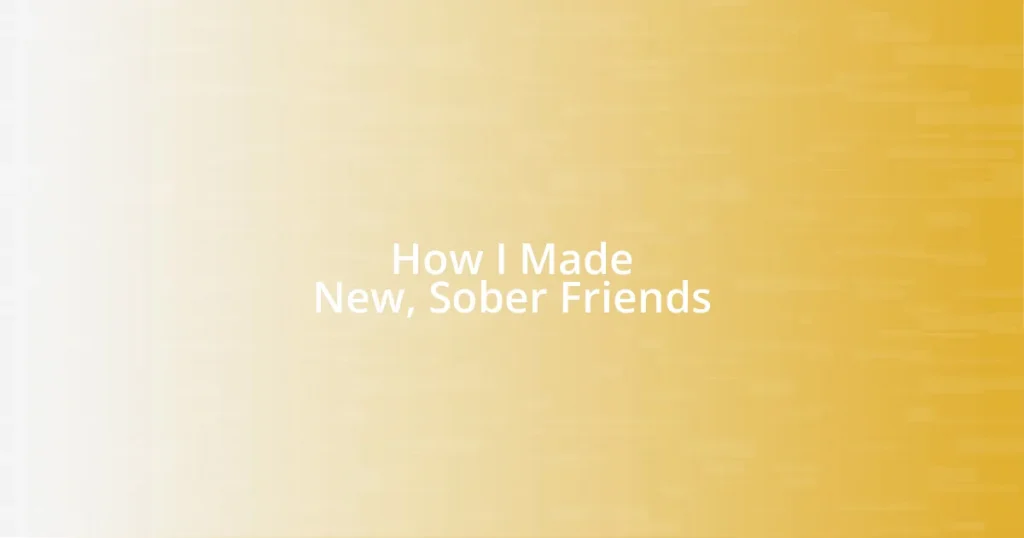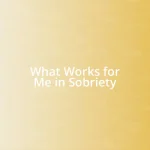Key takeaways:
- Engaging in sober social activities, such as game nights or pottery classes, fosters genuine connections and friendships.
- Building trust and open communication is essential in sober relationships, allowing for shared vulnerability and support during tough times.
- Nurturing friendships through regular check-ins and shared experiences helps strengthen bonds and collective growth in sobriety.
- Transforming friendships into lasting support requires intentionality, encouragement, and being present for each other during challenging moments.

Engaging in sober social activities
Finding sober social activities can be a game changer in forging new friendships. I recall my first experience at a community game night where laughter filled the air, and everyone seemed to connect over a simple board game. It struck me how freeing it felt to enjoy each other’s company without the pressure of alcohol – it was refreshing!
Have you ever considered how creative pursuits can bring people together? I joined a pottery class, and honestly, it was one of the best decisions I ever made. The process of molding clay sparked conversations with fellow participants, leading to genuine connections. Sharing laughter over our imperfect creations reminded me that vulnerability can foster deeper relationships.
Attending local hiking groups is another fantastic way to meet sober friends. I remember one trip where we set out at sunrise, feeling the cool air on our faces and soaking in nature’s beauty. As we climbed and shared stories, I realized that these shared experiences created bonds that were both meaningful and lasting. Isn’t it amazing how being in nature can amplify those connections?

Building trust and open communication
Building trust in any relationship is crucial, especially when forming connections in sobriety. I remember sitting in a small coffee shop with a couple of my new sober friends, sharing our past experiences and honest feelings. That moment of shared vulnerability was powerful; we all felt a weight lifting as we celebrated our journeys together. Trust grew in that space because we were open, sharing our true selves without fear of judgment.
Open communication goes hand in hand with trust. I found that being transparent about my feelings and asking for support in times of need made all the difference. I once reached out to a friend during a tough day; their immediate understanding and willingness to listen forged a deeper bond between us. It’s surprising how simply expressing thoughts and emotions can lead to stronger relationships.
In my experience, trust builds gradually but solidifies quickly with the right conversations. I vividly recall a heart-to-heart session with a friend who shared struggles with cravings. By being candid about our fears and aspirations, we reinforced our commitment to one another. This exchange not only deepened our friendship but also served as a reminder that we are not alone on this journey.
| Building Trust | Open Communication |
|---|---|
| Requires time and shared experiences | Fosters connection through honesty |
| Strengthens relationships over time | Facilitates understanding and support |

Nurturing and maintaining sober friendships
Nurturing sober friendships takes intention and effort, but the rewards are immeasurable. I remember how I initiated weekly coffee meet-ups with my sober friends. These gatherings weren’t just about catching up; they blossomed into a safe space where we encouraged each other in our sobriety journeys. We celebrated small victories together, like one friend who was brave enough to share how they’d turned down a drink at a recent gathering. It’s these moments of collective growth that nurture our relationships and remind us of the strength we derive from one another.
Maintaining these friendships also requires a bit of creativity. Here’s how I keep the connection alive:
- Regular check-ins: I send a quick text or call, reminding my friends I’m thinking of them.
- Shared activities: Scheduling regular outings, like hikes or movie nights, helps us create new memories.
- Supportive gestures: A simple note or small surprise can go a long way in showing I care and am here for them.
- Being vulnerable: I make it a point to share my struggles and encourage my friends to do the same; it’s grounding and comforting.
These practices help solidify the bonds we’ve cultivated, making it easier to weather the tougher days together. The beauty in these friendships lies in their ability to grow deeper through authenticity and mutual support.

Transforming friendships into lasting support
Transforming friendships into lasting support requires a conscious effort to be present and engaged. I often find myself recalling a moment when a friend and I sat on a park bench during a particularly challenging week. As we shared our daily struggles, I realized how essential this exchange was not just for venting, but for solidifying the foundation of our friendship. Have you ever felt that spark of understanding when someone truly gets what you’re going through? It’s that instant connection that transforms a casual acquaintance into an indispensable support system.
Being intentional about uplifting one another is equally important. For instance, I started a tradition where we would each share one positive affirmation with the group every week. This light-hearted practice not only boosted our spirits but also deepened our commitment to each other. It’s fascinating how something as simple as exchanging words of encouragement can transform a friendship into a lifeline. Have you ever considered how a few positive words could impact your day?
Additionally, I think it’s essential to establish a commitment to being there through thick and thin. I remember a time when I faced a personal setback and reached out to a friend. They didn’t hesitate to drop everything to support me, reminding me that our friendship was built on mutual reliability. Moments like these resonate deeply; they highlight that, in sobriety, we’re not just friends but allies in a shared journey. What does true support look like to you? For me, it’s showing up when it counts the most.














